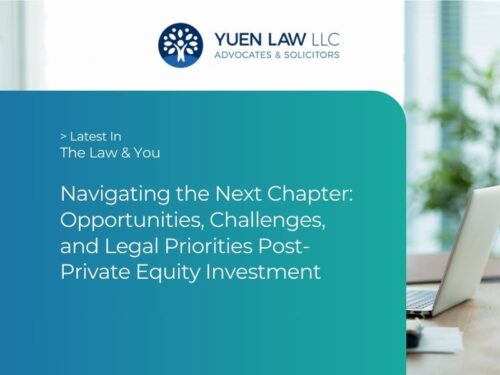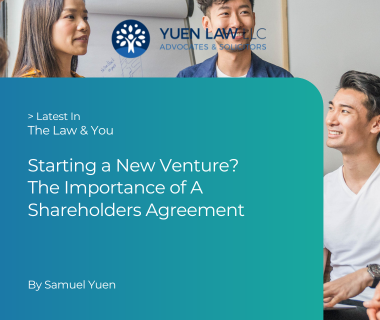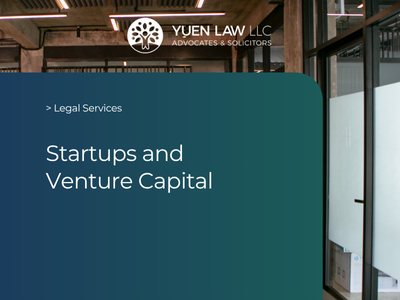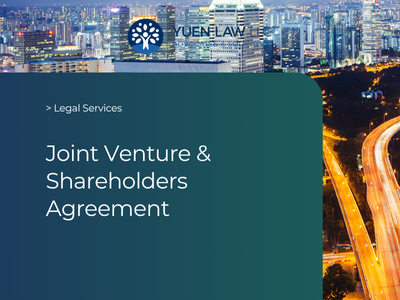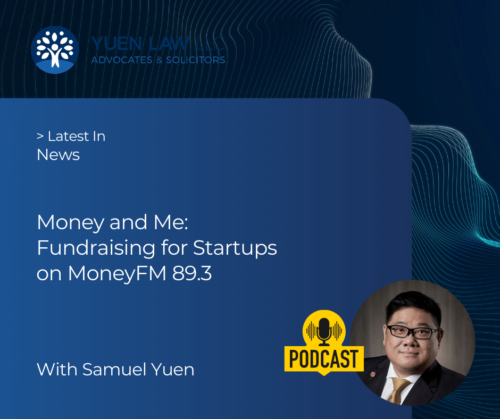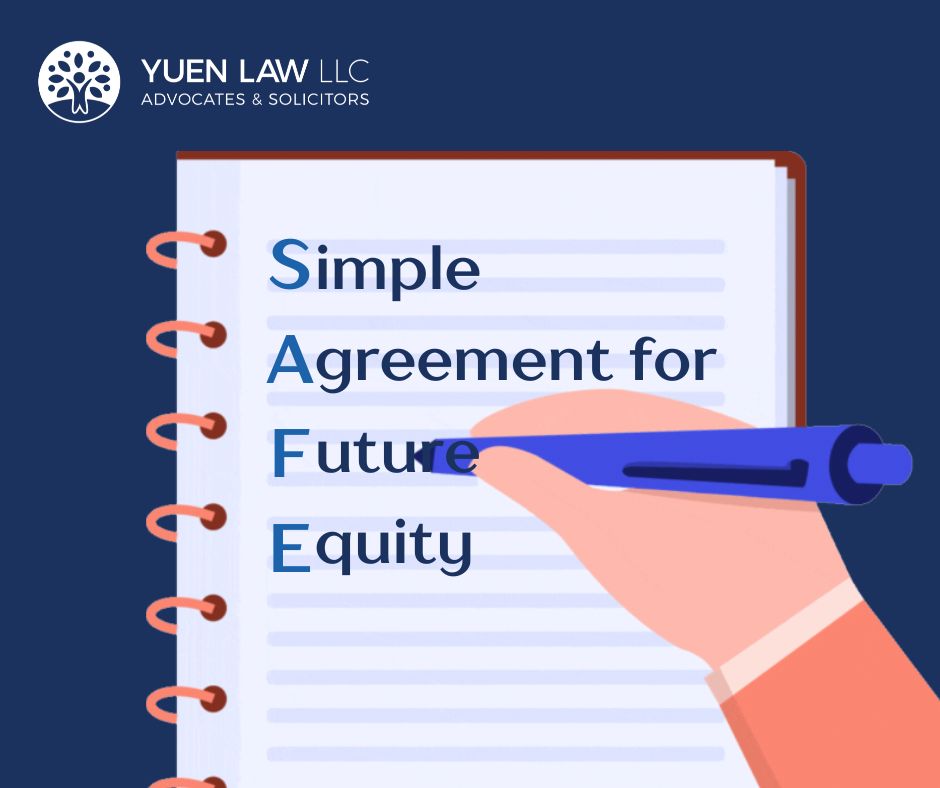
Keen to raise capital without the headache of determining a valuation too early? That’s where a SAFE comes in. A popular choice for startups in early-stage financing rounds, SAFEs allow founders flexibility to delay valuation conversations until later down the road. In this article, we will explain what SAFE is, the features of SAFE and the pros and cons of raising capital with SAFE agreements.
What is a SAFE Agreement?
A SAFE is an investment instrument that allows startups to raise funds without setting an immediate valuation. Typically used in seed or bridge funding rounds, SAFEs offer a simple and efficient way for founders to secure early-stage investment.
Y-Combinator, a startup accelerator based out of California, had wanted to simplify the process of early-stage fundraising, and introduced SAFEs in 2013 for its startups. SAFEs have since become a widely used in the United States, Canada and Israel. In recent years, SAFEs are widely used closer to home, in Southeast Asia jurisdictions such as Vietnam and Indonesia, and has also gained traction in Singapore’s startup ecosystem, with more founders turning to SAFEs as a fast and straightforward alternative to traditional equity or debt financing.
How a SAFE Agreement Works
A SAFE is an agreement between a startup and its investor. The investor invests capital into the startup, however, instead of receiving shares immediately, the investor gains the right to purchase shares at a discounted price and/or at a valuation cap upon certain trigger events, most commonly, the startup’s next formal equity financing round also known as a priced round.
What Happens After Conversion?
When an investor’s SAFE converts into shares, the SAFE agreement terminates, and the investor officially becomes a shareholder in the company. At this stage, it is common for the investor to sign a shareholder’s agreement, which outlines their rights an obligations as a shareholder.
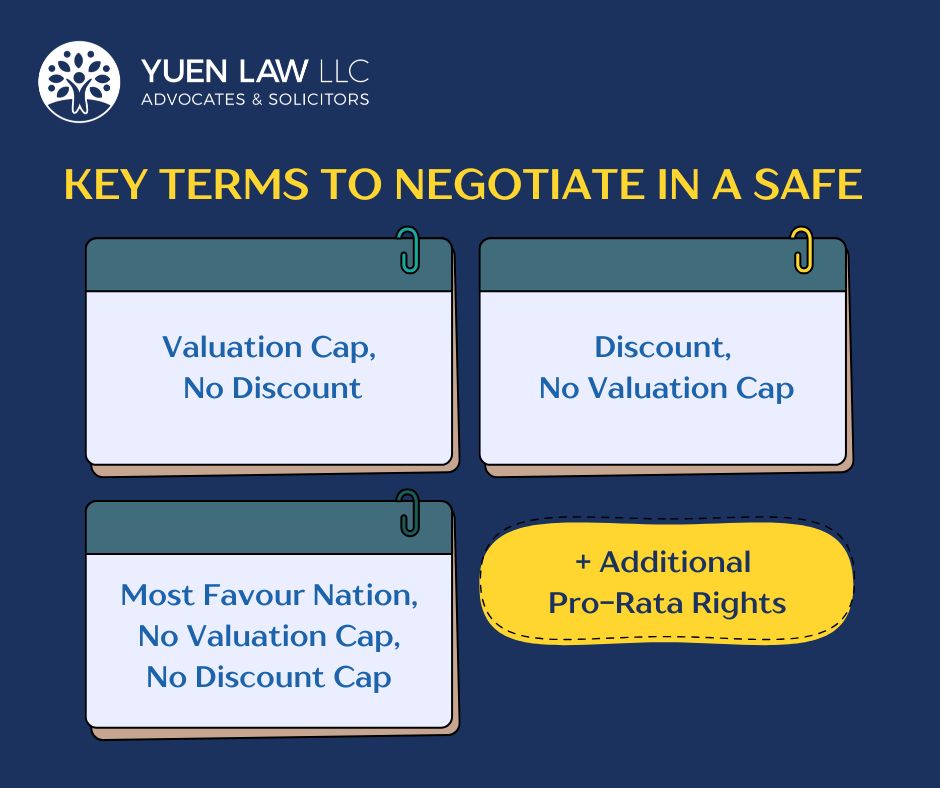
Common Features of a SAFE Agreement
1. Valuation Cap
A valuation cap sets the maximum valuation for the purpose of determining the maximum price per share when converting a SAFE. If the startup’s value exceeds the cap during conversion, the investor’s equity stake is calculated based on the lower valuation, ensuring they receive more shares. This feature rewards investors for the risk they take in supporting the startup early.
2. Discount Price (Conversion Discount)
The conversion discount allows investors to convert their SAFE into equity at a reduced price as compared to other incoming investors.
3. Pro-Rata Rights
When a company issues new shares to raise funds, an investor’s stake in the startup is diluted. To prevent this situation, the investor is offered the right to purchase more shares to maintain his percentage of ownership in the startup.
4. Most Favoured Nation Clause
The Most Favoured Nation clause typically states that if you offer new shares or other forms of securities to future investors with better terms like a lower valuation cap, then those terms will apply to existing SAFE investors as well. Once a SAFE investor converts to shares, then the Most Favoured Nation clause usually ceases to apply.
5. Trigger Event
There are specific events which automatically initiate the process of converting a SAFE into equity. The most common trigger is the next priced financing round, where the startup raises capital at a specific valuation. Other less common trigger events can include a change of control, such as the sale of the startup or an initial public offering. Because the conversion takes place upon the trigger event, there is no maturity date.
What do Founders Need to Consider When Raising Capital with a SAFE?
1. How Much Dilution Will I Face Once the SAFE Converts?
Founders should carefully consider how much equity they are willing to give up in future financing rounds. While SAFEs are flexible, excessive fundraising through SAFEs may lead to over-dilution when the SAFEs convert into equity, potentially deterring Series A investors.
2. How Will the SAFE Affect Future Fundraising Rounds?
Keeping track of SAFE investments is critical for managing dilution and understanding how each SAFE converts into equity. This can be done effectively through a cap table, especially when different investors come in with different terms. It is crucial for founders to have a rough idea of how much they want to raise in their next round. Raising too much through SAFEs could leave too little equity for Series A investors, making it harder to attract future investment.
3. What Milestones Will You Use the Capital to Reach?
During the seed funding round, it is essential to raise enough capital to achieve key milestones that can increase the valuation of the startup. These milestones could include product launches, revenue targets, or growth objectives.
4. SAFE for Ordinary Shares or Preference Shares
Founders must decide whether the SAFE will convert into ordinary shares or preference shares. Ordinary shares typically come with voting rights, providing investors with a say in the company’s decisions. In contrast, preference shares may not carry voting rights but often offer additional benefits, such as priority in liquidation and priority in dividend payments. The decision between the two types of shares can significantly affect both the investor’s rights and the company’s control structure, so it’s important for founders to carefully consider the implications of each option.
5. SAFEs Aren’t Necessarily Safe
SAFEs originated from a legal heritage which is vastly different from Singapore’s. Consequently, clauses in the SAFE may have been drafted in accordance with legal provisions which are not applicable, and which are foreign to Singapore’s legal system. A blind adoption of a SAFE document without due review by a competent and experienced commercial lawyer licensed to practice Singapore law may open the founder up to unnecessary obligations and unenforceable claims against counterparties.
Pre-money VS Post-money SAFEs
There are two types of SAFES: (1) pre-money SAFEs and (2) post-money SAFEs. This refer to the valuation at which a startup’s equity is calculated for conversion into shares when a future financing round occurs.
Pre-money SAFEs
In a pre-money SAFE, the valuation cap is applied before the new investment is added. This means the investor’s percentage of ownership is calculated based on the company’s value before the new round of funding. Consequently, the investor may receive a larger ownership stake compared to a post-money SAFE. The exact ownership percentage is typically unclear until the SAFE converts, as it depends on various factors, including the investor’s specific conversion terms which could include the discount rate and valuation cap, as well as the stake acquired by incoming investors in the subsequent priced round.
Post-money SAFE
In a post-money SAFE, the valuation cap is applied after the new investment is factored in, meaning the investor’s equity percentage is calculated based on the company’s value after the funding round and the new SAFE conversions. This allows the investor to better predict their ownership stake because the total dilution from the new investment is included in the calculation.
In short, a pre-money SAFE typically benefits investors by giving them a larger ownership stake, while a post-money SAFE gives founders more clarity on dilution before entering a funding round.
Advantages and Disadvantages of Fundraising with SAFEs
Advantages
Simplified Legal Documentation
SAFEs are quicker to execute and involve less legal complexity compared to traditional priced rounds, reducing the need for lengthy negotiations and complex legal documents. This accelerates the fundraising process, making them attractive to both startups and investors who wish to close the deal quickly.
Lower Fundraising Costs
By simplifying the fundraising process, SAFEs reduce the legal and administrative costs of fundraising as compared to a priced round. This is especially beneficial for startups who need to maximize their funding for business growth.
No Repayment Obligations
Unlike debt financing, SAFEs do not accrue interest and have no fixed maturity date, this means that there is no financial pressure on the startup to repay the investment, and no fixed timeline for the investor to expect a return on their investment.
Deferred Valuation
Startups in their early stages may lack revenue and market validation, bringing investors too soon, might prematurely lower valuations, setting unfavourable benchmarks for future rounds. SAFEs provide startups with the flexibility to defer valuation discussions until a priced financing round.
Disadvantages
Less Certainty on the Actual Ownership Stake for Investors
Some investors prefer priced rounds for greater certainty on their eventual ownership of their shares. Since conversion into equity occurs at a future priced round, the exact number of shares and ownership stake is unclear until conversion, and there is a risk for significant dilution of ownership for the founders and new investors.
Steep Conversion Discounts
Startups may offer steep conversion discounts to attract investors—historically, we have seen steep discounts of up to 20% to 30%.
No Management Control for Investors
Since SAFEs delay ownership of equity, investors’ rights are limited, they do not have a right to vote at meetings, or influence and management decisions.
Samuel’s Nugget of Wisdom:
To provide the investors with greater comfort, startups often work with us to incorporate additional rights found in priced rounds into the SAFE. This may include board seats, investor veto rights, pro-rata rights, liquidation preference, and information rights (access to the startup’s financial and operational information).
Illiquid Investments
SAFEs are inherently illiquid, meaning investors cannot sell or transfer their interest in the startup until the SAFE converts into equity, usually at a future financing event. Until conversion occurs, the investor has no way to exit the investment or realising a return on their capital.
Risk of No Trigger Event
If the startup does not reach a future financing round or liquidity event, then SAFE may never convert into equity.
Alternative Ways to Raise Capital
What is the Difference Between SAFE, Convertible Note, and Equity Financing?
Convertible Notes
A convertible note is a type of debt financing instrument that can be converted into equity upon maturity. Unlike SAFE, convertible notes accrue interest and have a specified maturity date. In the event that the convertible note is not converted into equity at maturity, the startup has the obligation to repay the investor the principal amount, along with any interest accrued. It is important to note that because convertible notes earn interest, it can result in higher dilution for founders, as the accrued interest increases the amount of equity the investor will receive upon conversion.
Equity Financing
Equity financing involves the issuance or sale of shares in a startup in exchange for capital. Unlike SAFE, investors gain immediate ownership of shares, with the right to vote at meetings, depending on the class of shares issued. In equity financing shareholders are rewarded through potential capital gains, dividends (subject to company’s profitability), and exit opportunities through acquisitions or initial public offerings. However, shareholders assume the risk of losing their investment if the startup’s business does not do well, especially if the company fails to generate profits or struggles to attract further funding.
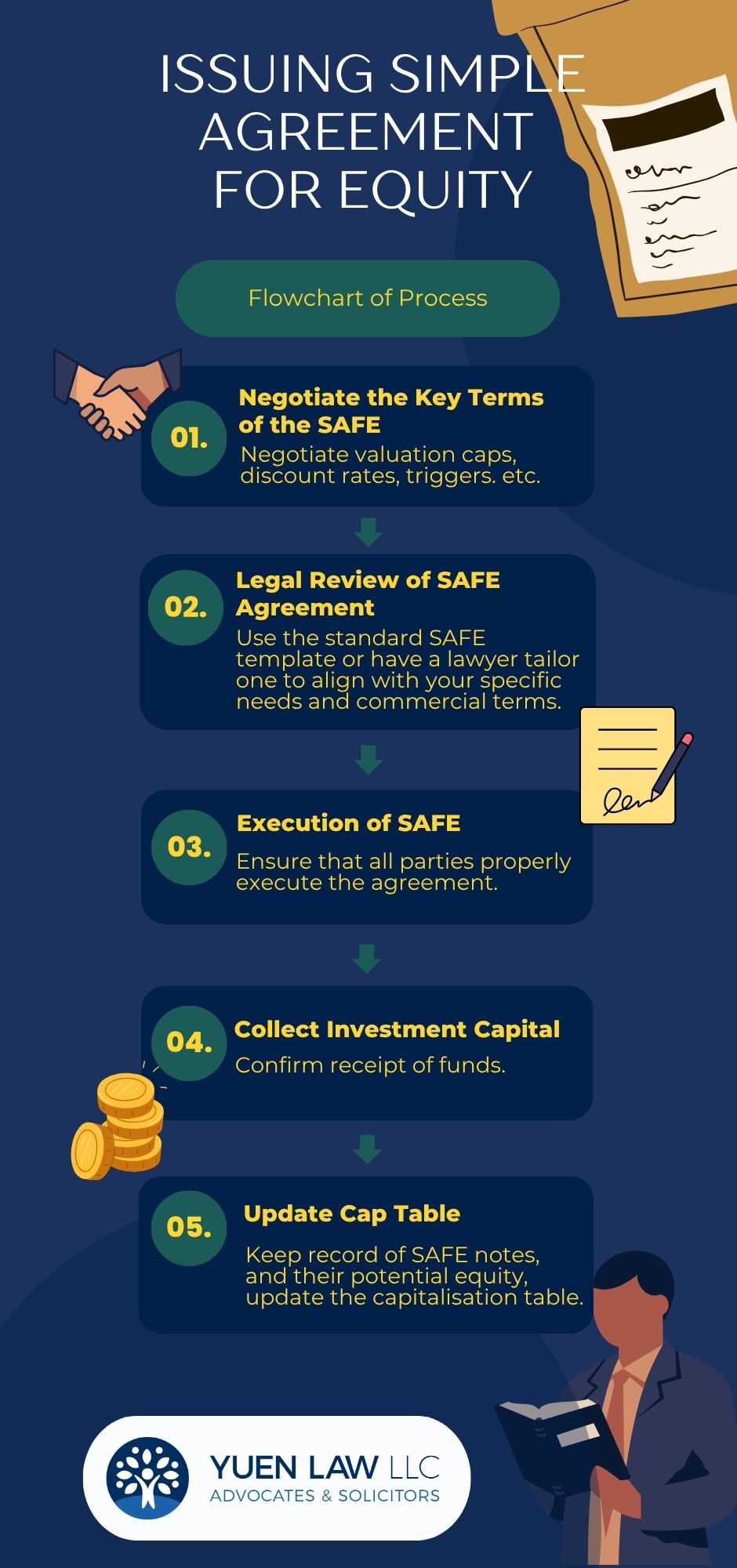
Getting Started with SAFEs
If you are a founder looking to raise capital efficiently and with minimal complexity, a SAFE could be the right solution for you. By understanding the key features and implications of SAFEs, you can make informed decisions on how to structure your fundraising to best position your startup for future fundraising rounds.
If you have questions or would like to learn more about how SAFEs can benefit your fundraising strategy, do reach out to schedule a discussion.


